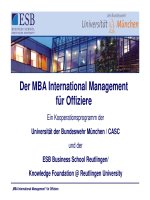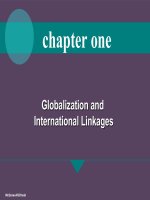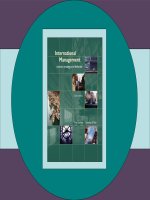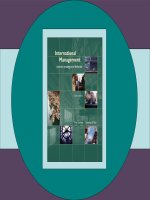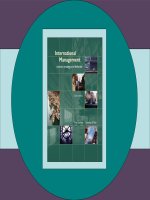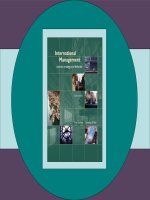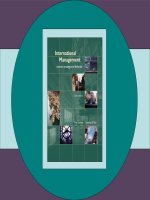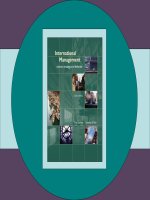International management cultural strategy and behavior chap014
Bạn đang xem bản rút gọn của tài liệu. Xem và tải ngay bản đầy đủ của tài liệu tại đây (705.22 KB, 45 trang )
chapter fourteen
Human Resource Selection and
Development Across Cultures
McGraw-Hill/Irwin
Copyright © 2009 by The McGraw-Hill Companies, Inc. All Rights Reserved.
Chapter Objectives
1. IDENTIFY the three basic sources that
MNCs can tap when filling management
vacancies in overseas operations in
addition to options of subcontracting and
outsourcing.
2. DESCRIBE the selection criteria and
procedures used by the organization and
individual managers when making final
decisions.
14-3
Chapter Objectives (continued):
3. DISCUSS the reasons why people return from
overseas assignments, and present some of the
strategies used to ensure a smooth transition back
into the home-market operation.
4. DESCRIBE the training process, the most common
reasons for training, and the types of training that
often are provided.
5. EXPLAIN how cultural assimilators work and why
they are so highly regarded.
14-4
Sources of Human Resources
•
MNCs can use four basic sources for filling
overseas positions:
•
(1) Home-Country Nationals (Expatriates):
Expatriate managers are citizens of the country where the
multinational corporation is headquartered
Sometimes called headquarters nationals
Most common reason for using home-country nationals
(expatriates) is to get the overseas operation under way
14-5
Sources for Human Resources
(2) Host-Country Nationals:
Local managers hired by the MNC
They are familiar with the culture
They know the language
They are less expensive than home-country personnel
Hiring them is good public relations
14-6
Sources for Human Resources
(3) Third-Country Nationals:
Managers who are citizens of countries other than
the country in which the MNC is headquartered or
the one in which the managers are assigned to work
by the MNC
These people have the necessary expertise for the job
14-7
Sources for Human Resources
(4) Inpatriates:
Individuals from a host country or a third-country national
who are assigned to work in the home country
The use of inpatriates recognizes the need for diversity at the
home office
Use of inpats helps MNCs better develop their global core
competencies
MNCs can subcontract or outsource to take advantage of lower
human resource costs and increase flexibility
14-8
Selection Criteria for International
Assignments: Managers
Adaptability
Education
Independence
Self-reliance
Knowledge of local
language
Motivation
Support of spouse &
children
Leadership
Physical & emotional
health
Age
Experience
14-9
Selection Criteria for International
Assignments
• Organizations examine a number of
characteristics to determine whether an
individual is sufficiently adaptable.
– Work experiences with cultures other than one’s
own
– Previous overseas travel
– Knowledge of foreign languages
– Recent immigration background or heritage
– Ability to integrate with different people, cultures,
and types of business organizations
14-10
Looking Abroad for Workforce
14-11
Skills MNCs Seek Within Countries
14-12
Expatriate Selection Criteria
14-13
Selection Criteria for International
Assignments
• Those who were best able to deal with their new
situation had developed coping strategies
characterized by socio-cultural and
psychological adjustments including:
– Feeling comfortable that their work challenges
can be met
– Being able to adjust to their new living
conditions
– Learning how to interact well with host-country
nationals outside of work
– Feeling reasonably happy and being able to
enjoy day-to-day activities
14-14
Activities That Are Important for
Expatriate Spouses
14-15
Selection Criteria for
International Assignments
• Applicants better prepare themselves
for international assignments by
carrying out the following three phases:
Phase 1: Focus on self-evaluation and general
awareness include the following questions:
Is an international assignment really for me?
Does my spouse and family support the decision to go
international?
Collect general information on available jobs
14-16
Selection Criteria for International
Assignments (continued)
Phase 2:
Conduct a technical skills assessment – Do I have the
technical skills required for the job?
Start learning the language, customs, and etiquette of the
region you will be posted
Develop an awareness of the culture and value systems of
the geographic area
Inform your superior of your interest in the international
assignment
14-17
Selection Criteria for International
Assignments (continued)
Phase 3:
Attend training sessions provided by the company
Confer with colleagues who have had experience in the
assigned region
Speak with expatriates and foreign nationals about the
assigned country
Visit the host country with your spouse before the
formally scheduled departure (if possible)
14-18
International Human Resource
Selection Procedures
•
Anticipatory Adjustment
– Training
– Previous experience
•
In-country Adjustment
– Individual’s ability to adjust effectively
– Ability to maintain a positive outlook, interact well with host
nationals, and to perceive and evaluate the host country’s cultural
values and norms correctly
– Clarity of expatriate’s role in the host management team
– Expatriate’s adjustment to the organizational culture
– Non-work matters
14-19
The Relocation Transition Curve
14-20
Common Elements of
Compensation Packages
• Compensating expatriates can be difficult because
there are many variables to consider
• Most compensation packages are designed around
four common elements:
•
Allowances
•
Base Salary
Taxes
Benefits
14-21
Relative Cost of Living in
Selected Cities
14-22
Common Elements of
Compensation Packages
• Base salary
– Amount of money that an expatriate normally receives in
the home country
• Benefits
– Should host-country legislation regarding termination of
employment affects employee benefits entitlements?
– Is the home or host country responsible for the expatriates’
social security benefits?
– Should benefits be subject to the requirements of the home
or host country?
– Which country should pay for the benefits?
– Should other benefits be used to offset any shortfall in
coverage?
– Should home-country benefits programs be available to local
nationals?
14-23
Common Elements of
Compensation Packages
• Allowances
– Cost-of-Living Allowance
• Payment for differences between the home country and the overseas
assignment.
• Designed to provide the expatriate the same standard of living enjoyed
in the home country
– May cover a variety of expenses, including relocation, housing,
education, and hardship
– Incentives
• A growing number of firms have replaced the ongoing
premium for overseas assignments with a one-time,
lump-sum premium
14-24
Common Elements of
Compensation Packages
• Taxes
– Tax equalization
– An expatriate may have two tax bills for the same pay
• Host country
• U.S. Internal Revenue Service
– MNCs usually pay the extra tax burden
14-25

